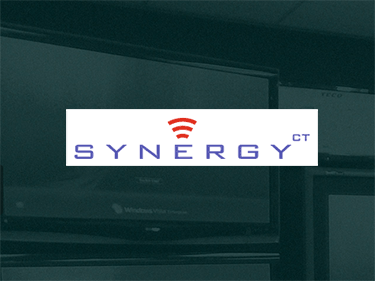Celebrating Ten Years, Synergy Rebrands for the Future

A daily selection of features, industry news, and analysis for AV/IT professionals. Sign up below.
You are now subscribed
Your newsletter sign-up was successful
- How does the future see AV? Decades from now, business schools will likely provide history lessons that illustrate the early 20th-Century shift from products to “solutions." As the AV industry conducted this shift, there were a lot of possible angles to take in the rebranding of our services. The word “integration” seemed great for a minute, until every industry claimed they integrated everything from plumbing to networks. Fortunately, the buzz around “unified communications” has finally made it clear: We sell communications. The best part is, people actually know what that word means, and everyone needs some version of it.
To mark its 10th anniversary, the company has rebranded to Synergy CT, to boldly proclaim its focus on Communication Technology. Ten years ago, when Todd Spell set out to launch his own company, he named it “Synergy AV.” The firm was founded in Houston, TX, and enjoyed rapid growth with clients in the industries of oil and gas, energy, healthcare, financial services, and higher education throughout its markets of Texas and Louisiana, and then beyond to the national and international levels for certain clients.
As the years went by, the firm naturally coalesced around the broader “solution” of communication. A large part of its business now involves visualization rooms, telepresence, and collaboration technology, leading to the provision of technologies that don’t quite fit the traditional definition of “audiovisual”.
So, to mark its 10th anniversary, the company has rebranded to Synergy CT, to boldly proclaim its focus on Communication Technology. It’s not just a name change, either. “Right now we are really focused on bringing video collaboration, or telepresence, to mid-level organizations,” Spell said of his now 20-person team. “Where in the past our typical customers were really large organizations, we're really excited about having solutions that open up the market to mid-level companies.” Mid-level, he explained, not in terms of revenue, but in terms of need—with three or more locations, 100-plus people in the organization. “A lot of those customers have been hesitant to make a move into video because of cost and technical complexities they perceive.”
Luckily, there’s a solution for that. Synergy CT has partnered with StarLeaf, a provider of cloud-based videoconferencing software and hardware endpoints, to increase its presence in the mid market. “We see that as a big part of our growth,” Spell said. “We’re not only increasing the number of our customers, but also increasing our revenue stream as a service provider.”
StarLeaf features a number of differentiating factors, chief among them possibly being the ability to do point-to-point calling without using any of the client’s parcel of multipoint conferences. Ease of use and scalability are also going to be great selling factors as Synergy CT reaches out to a new base of customers “that right now have little or no experience with video,” Spell explained. Understanding what factors will be attractive for them both from a functionality and cost standpoint will come in part from Synergy CT’s first-hand experience. “As we started delving into cloud-based solutions and used them in-house, we got to experience how user-friendly specifically the StarLeaf solution is—the beauty of it is that StarLeaf is a total solution, hardware through to licenses and support. So we can help if a customer wants to buy a multipoint conference room or two or three, or a point-to-point setup, and also if they only need a desktop solution for their mobile people. Usually we're finding that it's a combination of at least two of those needs, and as they use it, it grows to all three of those needs. They get to using it and it explodes in an organization, and they require even more meeting rooms.”
A growing need is certainly a good thing, and Spell sees a lot of potential ahead. As such, Synergy CT has engaged a marketing company to reach a new customer base in addition to its core energy industry base. New social media efforts are already showing results, but, Spell explained, “it's a very long-term, consistent messaging play, and we will definitely see even more results in the future.”
A daily selection of the top stories for AV integrators, resellers and consultants. Sign up below.
